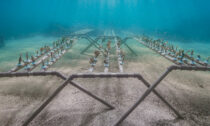
Ocean temperatures are rising every year, according to a 2021 UN report, which means certain marine species vulnerable to heat, such as corals, are becoming increasingly endangered. In Brazil’s Northeastern Pernambuco state, a scientific initiative is trying to fight back. Since 2017 the Corais Biofactory, a local scientific startup, has developed a technique to aid coral restoration by using “nurseries”. In these spaces, scientists rehabilitate damaged corals taken from the sea. After the treatment, they reintroduce them into Pernambuco’s coral reefs.
The work is a pioneering effort in Brazil, as it uses 3D-printed bases that serve as support for the coral while it undergoes rehabilitation. More than a thousand coral fragments have already undergone treatment in the “nurseries.”
Restoring Protected Areas
This effort is really important for the region. Reefs have a huge relevance for the state of Pernambuco, whose capital is even called Recife—which means reef in Portuguese. The region is home to the Costa dos Corais Marine Reserve, which is the largest coastal protected area in Brazil with more than 400.000 hectares.
However, recent studies by a team of local universities show the area has suffered “unprecedented” bleaching events, which caused a mortality rate of up to 50% in certain coral species. “The populations of two Brazilian endemic species (Millepora braziliensis and Mussismilia harttii) are severely threatened by global warming and that overall coral cover has been drastically reduced,” the study highlights.
Around the world, these “marine rainforests” are the home of 25% of the species in the oceanic ecosystem. That means that at least a quarter of all marine species spend some time of their lives on coral reefs.
Because of this, Corais Biofactory set up to restore some of the reefs most affected by bleaching events, through a sort of “assisted replanting” of inbred corals. According to the startup’s CEO, Rudã Fernandes, he started the initiative in an effort to support local communities.

Coral “nurseries”
Fernandes, CEO of the Biofactory, which today has become an environmental startup, says that the project started to collect coral fragments for use in aquariums. However, upon witnessing the impacts of bleaching events, he set out to make an effort to restore the coastal reefs.
The Biofactory has made pioneering work in Brazil with coral nurseries. More than a thousand coral fragments have already been collected from coral reefs to strengthen them and then reintroduce them back into the ocean.
Researchers collect two species of corals: Millepora alcicornis (fire coral) and Mussismilia harttii (cauliflower coral) that have at least 50% skin loss. Researchers snorkel or dive to make collections for analysis.
They lead the corals to the allied laboratory of the Federal University of Pernambuco. Each coral has a base made specifically for each of them in a 3D printer. They adapt the base to their growth and fortification.
After being collected, corals can stay up to three months while they strengthen themselves and develop a strong base. This recovery is closely monitored by scientists in the lab. Once they’re firm, they’re taken near the reefs and analyzed for more than six months. Finally, they’re transplanted to their natural environment, where they’re monitored for two more years.
The Biofactory is not yet in the Costa dos Corais Reserve. It was created nearby in the region of Porto de Galinhas. But with the support of WWF-Brazil, they want to reach this site in 2022.
Subsistence for communities
The maintenance of corals plays a fundamental role for local communities. About 80% of the Brazilian population lives in coastal regions. The loss of coral protection can aggravate problems such as the strongest tides invading houses, destroying hotels, and submerging cities completely, experts say.
At a global level, about 850 million people depend in some way on reefs. “Preserving corals is preserving our food security,” said Vinícius Nora, conservation analyst at WWF-Brazil. In reef regions, 95% of the world’s commercially important fish depend on coastal habitats.
The Biofactory also works directly with local communities in Pernambuco, which depend on tourism and fishing. “They help us a lot in monitoring, because they understand that it is their future and their children’s future to keep the corals healthy”, adds Rudã Fernandes.











Social Profiles